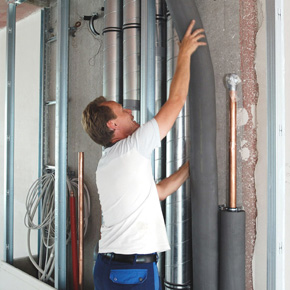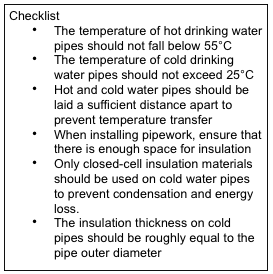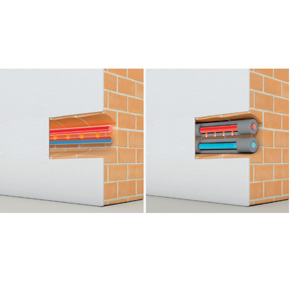
How to reduce the risk of legionella
Anthony Barnett of Armacell looks at the health benefits of using closed-cell insulation, including reducing the risk of legionella.
Legionnaries’ disease is a severe form of pneumonia that is transmitted through pathogens in water. Common sources of infection include contaminated air-conditioners, swimming pools and cooling towers, with estimates varying between 10,000 and 20,000 cases each year.
 The disease is contracted by inhaling airborne water droplets, which can be created by hot and cold water outlets, atomisers, showers and wet air conditioning plant.
The disease is contracted by inhaling airborne water droplets, which can be created by hot and cold water outlets, atomisers, showers and wet air conditioning plant.
The bacteria multiplies where water temperatures sit between 20-45°C and nutrients are available. However, legionnaires’ bacteria is dormant below 20°C and cannot survive above 60°C.
The risk of legionella therefore rises during the summer period as water stagnates in the pipes and the water temperatures rise, making HVAC and plumbing systems an ideal breeding ground for harmful bacteria.
Legionnaires’ bacteria is a particular concern in hospitals schools and care homes, as it usually affects those who are old, have pre-existing conditions or suffer with immunosuppression.
100% insulation
One of the most effective measures for reducing the risk of Legionnaires’ disease is to insulate both hot and cold water pipes using suitable materials, as poorly chosen insulation can result in the HVAC system operating in optimum conditions for the bacteria to breed.
 To tackle this issue, it is important to ensure that water circulates continuously through the pipework and does not drop below 45°C in hot water pipes. Likewise, water in cold water pipes should not rise above 40°C.
To tackle this issue, it is important to ensure that water circulates continuously through the pipework and does not drop below 45°C in hot water pipes. Likewise, water in cold water pipes should not rise above 40°C.
Cold water pipes should also be protected against heat gain by ensuring sufficient clearance or preferably by insulating properly. Similar requirements apply for hot water pipes to protect them against heat loss.
When hot and cold pipes are laid in one duct or wall cavity, or wherever water is not circulated regularly, it is recommended that ‘100% insulation’ is used.
100% insulation is where the insulation thickness corresponds to the pipework outer diameter. On hot water pipes, this helps to prevent legionella and protects the pipes against unnecessary energy losses. On cold water pipes, 100% insulation offers protection against freezing in cold weather conditions and provides protection against unwanted temperature rises.
Specifying the correct insulation material also prevents condensation. Armacell recommends closed-cell insulation for this as it offers a high resistance to water vapour diffusion, making it ideal for use on cold drinking water pipes.
In practice accidental damage to insulation has shown that open-cell insulation materials do not prevent moisture ingress as a result of diffusion.
This means that there is a risk of airborne water vapour penetrating the insulation, condensing and saturating the insulation material. As the material dampens, the thermal conductivity increases and insulation properties deteriorate, causing greater energy losses. In addition, corrosion and other damages can also occur.
Closed-cell insulation
Closed-cell insulation with anti-microbial protection is proven to prevent unwanted increases or decreases in water temperature. The closed-cell material structure of the insulation also prevents energy losses, moisture ingress and the subsequent corrosion of heating and plumbing pipework.
This makes it ideal in the prevention of legionnaires’ disease.
Armacell
Mars Street
Oldham
Oldham
Lancashire
OL9 6LY
UK
0161 287 7000
Visit Supplier's page
Latest news

21st February 2025
ASSA ABLOY EMEIA: Save valuable time and money with a seamless switch to programmable digital keys
In 2025, access management can be a whole lot easier. By making access part of their digital processes, businesses can put time-consuming key management and the cost of changing the locks firmly behind them. Making this switch is a lot easier than many people think, as ASSA ABLOY explains here…
Posted in Access Control & Door Entry Systems, Architectural Ironmongery, Articles, Building Industry News, Building Products & Structures, Building Services, Doors, Facility Management & Building Services, Health & Safety, Information Technology, Innovations & New Products, Retrofit & Renovation, Security and Fire Protection
21st February 2025
Showersave supports industry leaders in addressing Part L and Part G regulations
Showersave has sponsored and participated in a recent Building Insights LIVE roundtable on ‘Water & Energy Saving Innovations in New Build Housing’.
Posted in Articles, Bathrooms & Toilets, Bathrooms, Bedrooms & Washrooms, Building Associations & Institutes, Building Industry Events, Building Industry News, Building Products & Structures, Building Regulations & Accreditations, Building Services, Exhibitions and Conferences, Interiors, Pipes & Fittings, Plumbing, Retrofit & Renovation, Sustainability & Energy Efficiency
21st February 2025
GEZE: The importance of Specifying High Quality Door Closers on Fire Doors
Andy Howland, Sales & Marketing Director at GEZE UK, discusses why specifying high quality door closers on fire doors is important…
Posted in Access Control & Door Entry Systems, Accessibility, Architectural Ironmongery, Articles, Building Industry News, Building Products & Structures, Building Regulations & Accreditations, Building Services, Doors, Facility Management & Building Services, Health & Safety, Posts, Restoration & Refurbishment, Retrofit & Renovation, Security and Fire Protection
21st February 2025
Insight Data achieves ISO9001 recertification with zero non-conformities
Leading industry data specialist, Insight Data, has successfully achieved the prestigious recertification for ISO9001 with zero non-conformities for the fourth consecutive year.
Posted in Articles, Building Industry News, Building Regulations & Accreditations, Building Services, Information Technology, Research & Materials Testing
 Sign up:
Sign up: